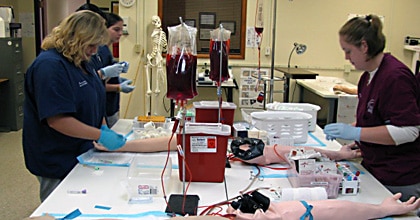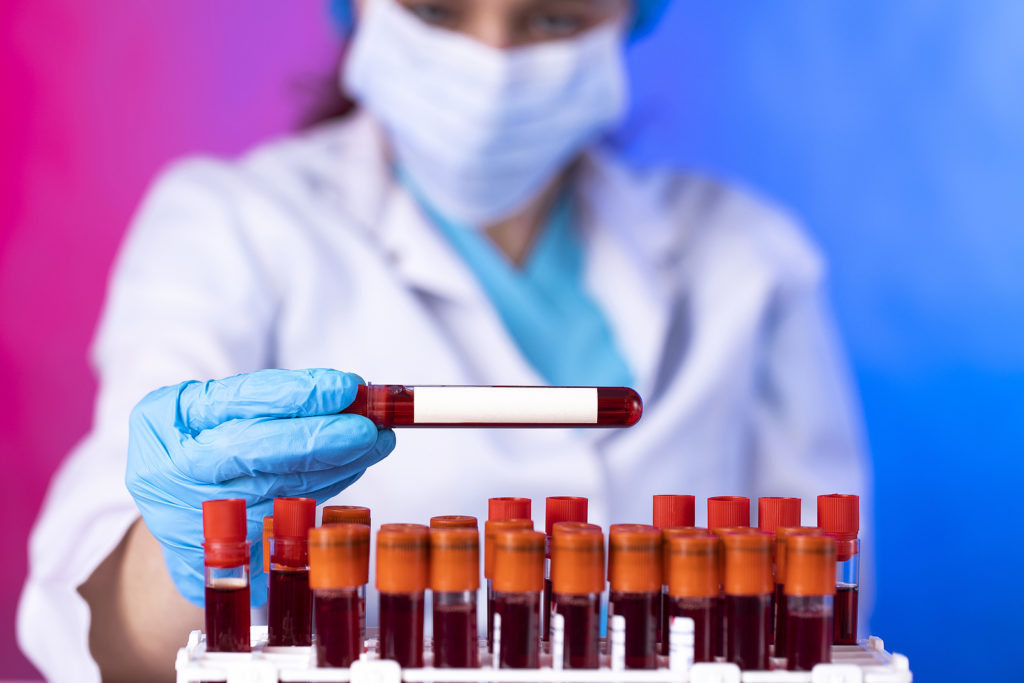Phlebotomy Classes Near Me: How to Choose the Best a Local Training Option
Phlebotomy Classes Near Me: How to Choose the Best a Local Training Option
Blog Article
The Course to Qualification: Comprehending the Phlebotomy Educating Program Trip and Its Relevance
As you take into consideration the path to qualification in phlebotomy, it's essential to comprehend the function you'll play in medical care. Your training will certainly cover important skills, from blood collection techniques to patient communication.

The Function of Phlebotomists in Healthcare
Phlebotomists play a crucial duty in the medical care system, serving as the crucial web link between patients and important analysis screening. You'll perform blood attracts, guaranteeing examples are accumulated properly and safely. Your expertise assists in diagnosing clinical conditions, keeping an eye on wellness, and directing therapy choices.
In your everyday interactions, you'll require to develop trust with clients, making them really feel comfy throughout what could be a difficult experience. You are in charge of classifying and handling samples meticulously to avoid contamination or mistakes, which might affect test results.
Yet, you'll usually function along with medical professionals and registered nurses, connecting essential info regarding individuals' conditions. Your role is basic in preserving the operations in medical care setups, making certain prompt and exact results. By grasping your abilities, you contribute meaningfully to client treatment, making you a vital component of the medical team. Embracing this responsibility is crucial to your success as a phlebotomist.
Overview of Phlebotomy Training Programs
When checking out phlebotomy training programs, you'll find different types developed to fit different schedules and finding out styles. Each program helps you establish essential abilities like blood collection and client interaction. Comprehending these alternatives is crucial to picking the right path for your job.
Kinds of Educating Programs
Several kinds of training programs are readily available for those looking to come to be skilled in phlebotomy. Additionally, some health centers and clinics provide on-the-job training programs, supplying useful experience while you discover. Whatever course you choose, each program aims to equip you with the essential skills for a successful phlebotomy occupation.

Secret Abilities Created
Grasping phlebotomy needs a set of essential abilities that are established through complete training programs. Furthermore, interaction abilities are fundamental; you'll need to connect with patients, discuss treatments, and placed them at simplicity. Each of these skills is important for your success as a licensed phlebotomist, making you a useful property in any kind of health care setup.
Trick Parts of a Phlebotomy Training Course
In a phlebotomy training course, you'll concentrate on crucial topics that prepared for your future occupation. You'll participate in hands-on training that allows you to apply what you've discovered in real-world setups. Both the core curriculum and functional experience are crucial for your success as a phlebotomist.
Core Educational Program Overview
While going after a phlebotomy training program, you'll encounter a core educational program made to furnish you with essential skills and knowledge. Phlebotomy Training Course. This curriculum usually consists of composition and physiology, focusing on the circulatory system and recognizing blood parts. You'll also find out about different types of blood collection approaches, including venipuncture and capillary leak techniques
Additionally, infection control and security protocols are essential elements, ensuring you know how to keep a sterilized setting. You'll research patient communication, highlighting communication and compassion, which are important for reducing patient anxiety. Moral and lawful factors to consider will be resolved, preparing you for real-world duties. This fundamental expertise will enable you to excel as a phlebotomist and supply top quality care in scientific settings.
Hands-On Training Experience
Obtaining hands-on experience is a vital part of your phlebotomy training course. This practical training enables you to apply what you've discovered in a real-world setting, boosting your abilities and self-confidence. Phlebotomy school.
Furthermore, you'll obtain the chance to communicate with individuals, which is vital for creating your communication skills. This combination of technical effectiveness and interpersonal skills is vital for your success as a certified phlebotomist. Eventually, hands-on training is where theory meets technique, strengthening your understanding and readiness for qualification.
Accreditation and Licensing Requirements
Prior to you can start your job in phlebotomy, it is crucial to recognize the certification and licensing needs that differ by state. Many states need phlebotomists to hold an accreditation from a recognized organization, such as the National Phlebotomy Organization or the American Culture Phlebotomy Training Course for Professional Pathology. These accreditations commonly entail passing a test that tests your knowledge and abilities in the area.
In addition to certification, some states have specific licensing demands. You may need to complete a certain number of hours in scientific practice, send evidence of training, or undertake a history check. It is very important to research your state's guidelines to make sure you fulfill all needed requirements.
Remaining educated about these needs not just helps you protect a position yet additionally boosts your reputation as a professional. By meeting these demands, you'll be well on your means to an effective career in phlebotomy.
Hands-On Training and Practical Experience
Hands-on training and sensible experience are necessary parts of your phlebotomy education and learning, as they permit you to apply academic understanding in real-world scenarios. Throughout your training, you'll participate in monitored venipuncture, find out correct methods, and end up being knowledgeable about numerous blood collection tools. This direct involvement is essential for constructing your confidence and honing your skills.
You'll function carefully with skilled experts who can lead you with the subtleties of individual communication and sample handling. Each practice not only reinforces your understanding but likewise prepares you for the fast-paced atmosphere of medical care setups.
In addition, several programs include clinical turnings, permitting you to experience diverse settings, from healthcare facilities to outpatient clinics. This direct exposure helps you adapt to different challenges and person requirements, ensuring you're well-prepared for your future duty. Embrace these chances, as they're crucial to coming to be a proficient and compassionate phlebotomist.
Challenges Encountered Throughout Training
While gaining hands-on experience is vital, it's crucial to acknowledge the obstacles that can emerge throughout your phlebotomy training. In addition, mastering the skills needed for blood attracts takes method; you might have a hard time with technique initially.
Time monitoring can likewise be a hurdle, as balancing concept, practical sessions, and individual dedications can feel daunting. You may encounter varying finding out rates among your peers, resulting in feelings of insecurity if you think you're falling back. Lastly, adapting to the various personalities of teachers can be difficult, as each may have an one-of-a-kind training style.
Recognizing these obstacles at an early stage can prepare you for success and help you create strength throughout your training trip.
Career Opportunities After Qualification

As you obtain experience, you could even consider concentrating on locations like pediatric or geriatric phlebotomy, providing to certain client needs. Some phlebotomists pick to advance their careers by coming to be lab specialists or going after further education and learning in health care areas.
Additionally, your accreditation can result in functions in training or managing brand-new phlebotomists, enabling you to share your understanding. With the medical care sector continually growing, your abilities will certainly constantly be in demand, leading the way for a secure and fulfilling profession. Embrace the possibilities waiting for you!
Frequently Asked Concerns
What Is the Regular Duration of a Phlebotomy Training Program?
Phlebotomy training programs normally last around 4 to eight weeks. You'll participate in hands-on practice, class guideline, and online understanding. Completing this training prepares you for certification and a fulfilling profession in medical care.
Are Online Phlebotomy Courses Available?
Yes, on the internet phlebotomy programs are available. They supply adaptability and convenience, enabling you to study at your own pace. Simply validate the program is approved to satisfy accreditation demands and acquire beneficial abilities for your job.
Just How Much Does Phlebotomy Training Generally Price?
Phlebotomy training typically costs between $700 and $2,500, relying on the program and location. You should consider aspects like program size, included materials, and hands-on experience when choosing the ideal training for you.
What Are Common Requirements for Phlebotomy Training?
Usual prerequisites for phlebotomy training often consist of a senior high school diploma or GED, booster shots, and a history check. Some programs may likewise need standard healthcare knowledge or certifications, ensuring you're planned for hands-on training.
Can I Work While Completing My Phlebotomy Training?
Yes, you can work while finishing your phlebotomy training. Numerous pupils balance jobs with their researches, but make sure to handle your time effectively to ensure you fulfill both work and training commitments effectively.
Report this page